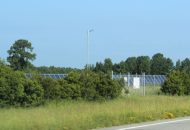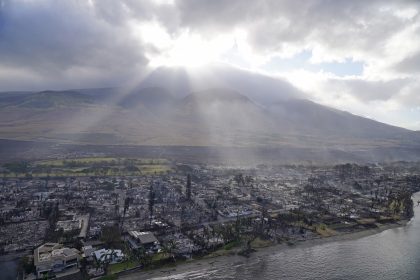With Senate Passage, Nation on Cusp of Having First Climate Law

WASHINGTON — “It wasn’t on the scoreboard one month ago,” Sen. Edward Markey, D-Mass., marveled when talking to reporters over the weekend, but in just a matter of days a budget reconciliation bill long presumed dead was suddenly a “historic” achievement.
And if the House follows suit later this week and gives its blessing to the sweeping $750 billion Inflation Reduction Act, as is expected, the federal government will have committed to making its largest investment in climate policy — $370 billion of the bill’s total — in U.S. history.
Even Sen. Bernie Sanders, I-Vt., a critic of the overall package, which he said “goes nowhere near far enough in addressing the problems facing struggling working families,” lauded the climate provisions of the package, which he called an “unprecedented … investment in clean energy efficiency.”
“This bill could help increase U.S. solar energy by 500% and more than double wind energy by 2035. That is no small thing,” he said.
So what exactly is in the package “slimmed down” from the original $2.2 trillion Build Back Better plan President Joe Biden pushed for last year?
To begin with, the bill provides a slew of tax credits to steer consumers from fossil fuels to reliance on clean, renewable energy and electric vehicles.
The tax credits include $30 billion to ramp up production of solar panels and wind turbines, the development of new batteries and more efficient energy storage, and to step up critical minerals processing here in the U.S.
It also includes $10 billion in tax incentives to spur the construction of new manufacturing facilities to make the next generation of solar panels and electric vehicles.
In addition, $500 million in tax credits will be made available through the Defense Production Act for heat pumps and still more aid for critical minerals processing.
Keeping in line with the Biden administration’s goal of providing equitable relief from the high temperatures and increased natural disasters that accompany climate change, the new package invests $60 billion to help those living in disadvantaged areas.
Nearly half of this money — $27 billion — is earmarked for the creation of the first-ever national green bank to help drive investments in clean energy projects in poor communities.
The bill also unravels former President Donald Trump’s 10-year moratorium on offshore wind leasing, and would also dramatically ratchet up the fees oil and gas companies pay to address leaks of methane — among the most potent of greenhouse gas emissions.
Along with all of these forward-looking measures, the package also includes a number of provisions Sen. Joe Manchin, D-W.Va., has argued are vital to addressing the nation’s current energy needs.
These include the offering of new oil drilling leases in the Gulf of Mexico and Alaska’s Cook Inlet, and a mandate that the Interior Department hold auctions for fossil fuel leases if it intends to approve new wind and solar energy projects on federal lands.
The bill would also expand tax credits for carbon capture technology that would allow coal and/or gas burning power plants to continue to operate with lower emissions.
According to a preliminary analysis of the Inflation Reduction Act published last week by the Princeton-led REPEAT Project, the bill would cut annual emissions in 2030 by an additional 1 billion metric tons below current policy (including the bipartisan infrastructure law); close two-thirds of the remaining emissions gap between current policy and the nation’s 2030 climate target (50% below 2005); get the U.S. to within 0.5 billion tons of the 2030 climate target; and reduce cumulative GHG emissions by about 6.3 billion tons over the next decade (through 2032).
The analysis goes on to say that enacting the Inflation Reduction Act would lower annual U.S. energy expenditures by at least 4% in 2030, a savings of nearly $50 billion dollars per year for households, businesses and industry.
In addition, it says, tax credits, rebates and federal investments in the act would shift costs from energy bills to the progressive federal tax base, lower the cost of electric and zero-emissions vehicles, heat pumps, and efficiency upgrades for individuals and businesses, and finance investments in energy productivity improvements and carbon capture equipment by industry.
“These savings do not include the additional downward pressure the act will put on prices for oil and natural gas by driving lower consumption of these commodities, which will further reduce U.S. energy costs,” the report says.
Using a spreadsheet model of oil and gas elasticities, REPEAT Project estimates that lower U.S. consumption of petroleum products and natural gas could reduce crude oil prices by approximately 5% and reduce U.S. natural gas prices by approximately 10%-20% in the medium term (2030-2035).
At the same time, the Inflation Reduction Act would drive nearly $3.5 trillion in cumulative capital investment in new American energy supply infrastructure over the next decade (2023-2032), the analysis says.
That includes more than $20 billion in annual investment in CO2 transport and storage, and fossil power generation with carbon capture by 2030.
The REPEAT Project sees the annual investment in hydrogen production (including electrolysis and methane reforming with carbon capture) under the bill as increasing to $3 billion annually by 2030, triple the levels under current policy, and rising to over $50 billion by 2035.
It also found that the act has the greatest impact on investment in wind power and solar photovoltaic, which nearly doubles to $321 billion in 2030, versus $177 billion under current policy.
“The act will drive substantial additional investments by households and businesses on the demand side of the energy system, including purchases of more efficient and electric vehicles, appliances, heating systems and industrial processes,” the analysis said. “It also provides tens of billions of dollars in grants, tax credits, and loan programs to develop manufacturing and supply chains for clean energy components, batteries, electric vehicles and critical minerals, spurring additional capital investment (and associated jobs) not captured in this report.”
Incentives for carbon capture, storage and use in the Inflation Reduction Act would build on demonstration funding in the bipartisan infrastructure law to make carbon capture a viable economic option for the most heavily emitting industries, such as steel, cement and refineries, as well as power generation from coal and natural gas, the analysis said.
The total volume of CO2 captured for transport and geologic storage across energy and industry could reach 200 million tons per year by 2030, if sufficient investment in transport networks and storage basins can be deployed, the researchers said.
That includes roughly 110 million tons across industries and 90 million tons in power generation. The project’s modeled results included 6 GW of carbon capture retrofits at existing coal-fired power plants and 18 GW of gas power plants with carbon capture installed by 2030, the analysis said.
Fred Krupp, president of Environmental Defense Fund, said in a press release before the Senate vote that he believed the Inflation Reduction Act of 2022 would “deliver what the American people want: lower energy costs, healthier communities and significant progress on climate change.”
“The proposed clean energy investments would help U.S. businesses be more competitive in the world while creating good jobs. And it would strengthen the reliability of power grids in communities across the country,” he said.
“Taken together, the proposed $369 billion in climate and clean energy investments would be a historic step by Congress to improve people’s lives. The robust package of tax credits would rapidly accelerate our shift toward a modernized economy and make electric vehicles, clean power and clean manufacturing more affordable,” Krupp continued.
“It is encouraging to see $60 billion to advance environmental justice, and we look forward to the continued leadership of environmental justice communities on these provisions. The package also includes a program to reduce methane emissions that harm human health, waste energy resources and drive climate change,” he said.
Reps. Tom O’Halleran, D-Ariz., Ed Case, D-Hawaii, Stephanie Murphy, D-Fla., and Kurt Schrader, D-Ore., all co-chairs of the Blue Dog Coalition of House Democrats, said in a statement that as a group, they’ve “long advocated for fiscally responsible policies” and believe “this bill will place the nation on a sounder economic footing.”
“We remain laser-focused on solving our nation’s major economic, energy and climate problems for future generations, and will move swiftly to send this bill to the president’s desk,” the Blue Dogs said.
Dan can be reached at [email protected] and @DanMcCue

























